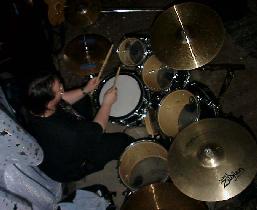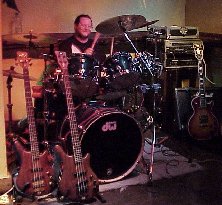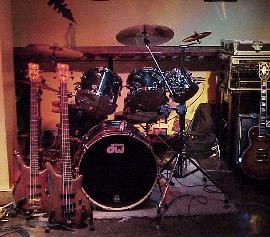 Yep, me and my instruments of choice, although it's equally true to say
that they chose me. I've been playing drums since around 1983-84, and
for the first 10 years or so it remained a hobby. Since then it's started
to take a more serious turn, and for the last few years I've been playing
pretty much semi-professionally.
Yep, me and my instruments of choice, although it's equally true to say
that they chose me. I've been playing drums since around 1983-84, and
for the first 10 years or so it remained a hobby. Since then it's started
to take a more serious turn, and for the last few years I've been playing
pretty much semi-professionally.
Some History
I was always musically inclined, but it took me a long time to find the right vehicle for my inclination. By the time I was ten I'd given up the violin after taking lessons for 2-3 years, and the piano after taking lessons for 2-3 minutes. (There was a piano in our house and I enjoyed messing around with it, but I could never muster any interest in learning exercises on it.) Over the next few years I sang in the school choir, but didn't do much else.
 But a chance encounter with a friend's drumkit at the age of fifteen
made me realise where my affinities - and abilities - really lay. My
parents were initially wary, given my previous inclination to study
expensive instruments for a while and then give up, but after I'd stuck
with drum lessons for 4 terms they were convinced I was in earnest and
shelled out for a second-hand kit. I stuck with the lessons for a further
four years. Nine years and four kits later I attended a clinic with jazz
legend Jim Chapin, and discovered I was holding the sticks wrong.
But a chance encounter with a friend's drumkit at the age of fifteen
made me realise where my affinities - and abilities - really lay. My
parents were initially wary, given my previous inclination to study
expensive instruments for a while and then give up, but after I'd stuck
with drum lessons for 4 terms they were convinced I was in earnest and
shelled out for a second-hand kit. I stuck with the lessons for a further
four years. Nine years and four kits later I attended a clinic with jazz
legend Jim Chapin, and discovered I was holding the sticks wrong.
I still am.
Within a few months of my trying out his kit, the aforementioned friend formed a band called Loose Tourniquet, who I jammed with whenever I got the chance. When he left them it seemed only natural that I would take his place. We finally broke up in early '94, although we keep suffering the occasional relapse.
A few months after that I got a phone call. "We need a drummer.
What are you doing saturday?" And so it was that, with only one
rehearsal and a gig four days away, I joined The Jansons, which led to
my current situation.
Geeky Equipment Bit
 After using several kits of progressively increasing quality by several
different manufacturers, I'm now using
DW drums.
They're custom-made drums, lovingly hand-crafted, and they look and
sound gorgeous. The only problem with them is they make me feel
horribly unworthy.
After using several kits of progressively increasing quality by several
different manufacturers, I'm now using
DW drums.
They're custom-made drums, lovingly hand-crafted, and they look and
sound gorgeous. The only problem with them is they make me feel
horribly unworthy.
I also have a brass piccolo snare drum, and a Chad Smith signature snare, both made by Pearl. My cymbals were mostly Paiste until recently, but my current setup has crashes and hi-hats by Zildjian.
I use Remo batter heads on my toms (Emperors) and kick drum (Powerstroke 3). I've used Remo coated CS on my snares in the past, then I tried Aquarian Satin Finish, but most recently I've settled on Evans dry vented heads. My sticks are Neil Peart signature oak 747's by Pro-Mark. I sandpaper the grip end before using them to remove the laquer; I find this prevents slippage when my hands are sweaty.
And finally, I now use Hearos #1001 Aqua ear defenders or, for preference, my in-ear monitor system, which consists of Shure E-1 earphones driven by a Behringer Eurorack MX602A mixing console.
Since they opened only a few miles away from me in 1997, almost all of my gear has been supplied through DrumWright.
I am not an endorsee of any of the above companies, and I receive no
payment, concessions or equipment in exchange for listing them here.
Although I do get the occasional cup of tea from DrumWright if I happen
to be hanging around in the shop while they're brewing up.
Influences
Some of the drummers who have inspired me over the years: (I hesitate to use the phrase "influenced my style", because they're mostly so far beyond my abilities that all I can really do is nick some of the less complicated bits.) Being a drummer isn't merely about keeping time and adding fill-ins to tell people that "the chorus goes here"; it's about laying down a groove, a rhythm which carries or drives the music and sets the mood. But beyond even that, drums have a lot to offer in terms of texture, tonal colour and embellishment, and even melody. Listening to these players taught me to appreciate that.
Neil Peart - Rush
I discovered Rush not long after I started playing drums, and was
impressed by the sheer busyness of Peart's playing, driving the music
without ever overwhelming it. (Admittedly it would have overwhelmed
it, were it not that his two fellow musicians are equally impressive.)
It was also my first serious introduction to music in uneven meters,
something which continues to fascinate me.
my picks:
Exit... Stage Left
Power Windows
Bill Bruford
- Yes, King Crimson, Earthworks
Equally at home with the ferocious rock of King Crimson or the delicate
jazz of his own band Earthworks, Bruford is an amazingly musical drummer
with a terrifying ability to change time signatures independantly of
the music going on around him.
my picks:
King Crimson - Discipline
Bill Bruford's Earthworks - Earthworks
Terry Bozzio
Another very musical drummer, though in a totally different way to
Bruford; he's much more a rock drummer, more muscular and without
that jazzy lightness. Renowned for his 4-way independence and his
use of tuned percussion, he's probably best known for his work with
Frank Zappa.
my picks:
Jeff Beck - Guitar Shop
Bozzio Levin Stevens - Black Light Syndrome.
Phil Collins - Genesis
Before taking over lead vocals from the departing Peter Gabriel,
Phil delivered some of the most exiting drum performances in rock
history, both with Genesis and his jazz-fusion side-project, Brand X.
He subsequently achieved greater fame as Genesis' frontman, and thence
as a solo artist, but to me the early albums he cut with Genesis
remain his - and their - golden age.
my picks:
Genesis - Foxtrot
Genesis - Selling England By The Pound
Genesis - The Lamb lies Down On Broadway
Genesis - A Trick Of The Tail
Simon Phillips
One of those intimidating players who really can play anything,
he's used his solo albums to deliver some surprisingly tasteful and
accessible jazz-rock fusion. (No, this description is not an oxymoron.
Really.) Currently a member of Toto, Simon has a list of session credits
as long as your arm, provided you have a very long arm.
my picks:
Simon Phillips - Symbiosis
Mike Rutherford - Smallcreep's Day.
Stewart Copeland - The Police
Another drummer with a flair for percussion. What fascinated me about
Copeland's playing was an odd bounciness far removed from straight
rock drumming, and a penchant for accents and pushes in odd places,
both of which I believe owed much to latin-american as well as the
Police's early experiments with reggae.
my picks:
Ghost In The Machine
Synchronicity
John Bonham - Led Zeppelin
Impressed initially by Bonham's sheer power and solidity, I later grew
to admire the spaciousness of his playing. Though capable of much more
he never played more than was necessary, and was versatile enough to
handle Zeppelin's regular mix of heavy rock, folk and eastern music with
ease, as well as their occasional departures into whatever took their fancy
at the time, be it latin-american, funk or reggae.
my picks:
Led Zeppelin IV
Physical Graffiti
There are too many other drummers and individual performances I enjoy and admire to name them all, but here - in no particular order - are a few:
Steven Perkins of Jane's Addiction has a wonderfully loose tribal feel. Matt Cameron - formally of Soundgarden, now in Pearl Jam - is another great feel player with an imaginative palette of rhythmic textures. Jerry Gaskill of King's X I admire for his ability to play straight and solid drum parts which still complement the band's more ethereal moments, and conversely for imbuing technically awkward off-kilter parts with a real fire.
Mark Brzezicki of Big Country, Tim "Herb" Alexander formerly of Primus, and Ian Moseley of Marillion all occupy similar territory, notable for their technique and percussive style. Within that territory however, it's interesting to note the differences in their playing, Brzezicki leaning towards precision and distinct accents, Mosely producing a more organic "feel".
I love Manu Katche's playing on Peter Gabriel's So for its floating rhythmic grace. Carter Beauford's performance on Crash by the Dave Matthews Band is awesome for its precision, feel and busy-ness, and for some parts which sound impossible until you find he's a left handed drummer who plays a right handed kit.
Chad Smith of the Red Hot Chilli Peppers is notable for his solid power and imaginative structures. Scott Rockenfield brings a similar approach to Queensryche, and their complex (esp. on Operation:Mindcrime) changes of time signature. Likewise, Bob Dalton of It Bites makes great use of time changes both within and against the band's music.
Since the departure of their original drummer Terry Chambers,
XTC have used several drummers in recording their albums.
Prairie Prince of The Tubes and Dave Mattacks of Fairport
Convention turned in superb "feel" drumming performances on
Skylarking and Nonsuch respectively, whilst
current King Crimson drummer Pat Mastelotto was meticulously,
almost mathematically precise on Oranges and Lemons.
Words Of Wisdom
I'll leave you with a few tips which may - if you're a fellow drummer and not some poor lay person who's arrived here by mistake - be of some use to you:
When learning:
Make an effort to learn the rudiments; these exercises are the building blocks from which all drumming begins.
Do try to find a tutor to teach them to you. They will help you avoid a lot of obvious mistakes.
Listen to as many different drummers and as many different areas of music as you can. Even if you only plan to work in one style your playing will sound fresher and more interesting if you have a vocabulary which goes beyond your chosen style, and you never know what you might be called upon to play in the future.
Try sticks of varying weights and lengths to find those which are right for you and the style of music you're playing. But also try practicing with sticks of different weights. I played heavy rock for many years and worked up through 5As to 2As. When I went back to the lighter 747s the extra speed and control I gained as a result came as a revelation.
Try practicing against a metronome. There's no better way of developing an accurate sense of time, and you may have to play against a click for real in future.
Try to join a band, or at least find some other musicians you can jam with on a regular basis. Learning to play along with other people is again a whole other skill, and one you can only learn through experience.
If opportunity arises, make tape recordings when you play together. Listening to your own playback will highlight those flaws in your playing which are not obvious to you in the moment, and will help you to listen out for and work on correcting them next time you play.
When gigging:
Carry spare sticks. Learn this lesson before you have to play a gig with two splintered stumps.
Carry one or two spare pairs of sticks somewhere other than your sticks bag, just in case you do something bloody stupid like forgetting your sticks bag. This also goes for other conveniently small items such as tuning keys, hex keys, ear defenders etc.
Carry a spare snare drum head, or ideally a spare snare drum. If you lose a tom during a gig you can work around it, and bass heads can be patched up with gaffa tape in emergencies, but if your snare head breaks you're stuffed.
Take a bottle of drinking water. You can get drinks holders which clamp to your stands and will hold a can or a pint glass. You'd be amazed how valuable it can be to have your drink in quick grabbing distance.
Take a towel.
Don't eat a heavy meal before performing unless you can allow at least an hour to digest. If you need to eat before you go on stage, stick to something light which will give you energy to burn.
Sand-papering the laquer off the grip end of your drumsticks will reduce slippage in sweaty hands. (Admittedly the increased friction might cause blisters, but if you're holding the sticks properly this shouldn't be a problem.)
And finally, and most importantly of all, use ear defenders. This point cannot be stressed highly enough. It may seem uncool, and I know that half the attraction of loud music is the adrenaline rush the volume generates, but consider this: you're at the centre of a very loud instrument, plus when playing live you'll have monitors playing the other instruments back at you just as loudly so you can hear the damn things to play along with. Under these circumstances, damaging your hearing is not merely a risk but a certainty, and if you ask any professional drummer for practical advice the first thing they'll say to you is "What? Speak up!"
This leaves you with two options; earplugs, or in-ear monitors.
There are many kinds of earplugs available, from simple rubber or foam plugs to generic ear shaped inserts to custom moulds made to fit your own ear. The latter two have the advantage of a more even frequency response, and are thus most valuable to singers who need to be able to key into the music they're singing to.
As the drummer, however, you'll simply need maximum noise reduction, and will probably be perfectly happy with simple (and above all, cheap) plugs as long as they fit. I've used foam plugs, but they filtered out too much treble and leave you with overly loud and distorted bass, and I've used generic ear-shaped rubber inserts, but they tended to get worn out easily and while the frequency response was better the overall noise reduction wasn't great. So I eventually settled on the aforementioned Hearos #1001 Aqua ear defenders, which are one size fits all moulded rubber plugs. They're a low cost option with an acceptable frequency response, and I was happy with them for a long time. When working with other people's PAs I still am.
More recently, however, I've switched to in-ear monitors. I've talked a lot about reducing the level of noise, so it may seem odd to be plugging monitors directly into your ears. But the advantages are many. Firstly, they isolate the ears from any external noise, which means they don't have to compete with the drums in terms of volume so the overall sound level you receive is quieter. Secondly, they allow you to hear everything with a great deal more clarity. Thirdly, when playing drums and doing backing vocals, they don't project back into your vocals mic, thus reducing feedback. And finally, they reduce the level of onstage noise overall, thus allowing greater clarity for all the other musicians. Being stationary in performance I don't need a radio system, so I drive my monitors through a mini mixing desk, basically because it was actually cheaper than finding a dedicated headphone amp.